Dogs have anal glands near their anus that secrete a smelly liquid used for identification and marking territory. However, sometimes these glands can become smelly due to various causes, leading to an unpleasant odor. It is important to address any anal gland issues with the help of a veterinarian.
Key Takeaways:
- Regular grooming and cleaning can help prevent and manage dog gland odor.
- Using pet-safe wipes designed for dogs can help remove anal gland secretions and reduce odor.
- Enzymatic cleaners can effectively neutralize pet odors, including those caused by anal gland secretions.
- Consult with a veterinarian for diagnosis and proper treatment of anal gland issues.
- Baking soda and vinegar can be natural remedies to eliminate dog gland smell, but always check with your vet first.
Signs of Anal Gland Issue in Dogs

Dogs can develop anal gland issues that can cause an unpleasant odor. It is important to be aware of the signs of anal gland problems in dogs so that you can address them promptly. Some common signs include:
- Greasy fur around the anus
- Thickening of the skin
- Pain and discomfort when sitting or defecating
- Excessive licking or biting of the anus
- Scooting on the floor
- Abnormal discharge or growths around the anus
If you notice any of these signs in your dog, it is important to consult with a veterinarian for a proper diagnosis and treatment plan.
In some cases, the anal gland issue may be caused by an infection. Other times, it may be due to blockage or other underlying health issues. Regardless of the cause, it is crucial to address anal gland problems to ensure the well-being of your furry friend. Your veterinarian can provide the appropriate treatment, which may include expressing or flushing the anal glands, prescribing topical antiseptics or medications, or recommending dietary changes.
Symptoms to Watch Out For
When it comes to anal gland problems in dogs, there are several symptoms to be aware of. These symptoms can vary depending on the severity of the issue and may include:
- Visible swelling or redness around the anus
- Foul odor coming from the anal area
- Excessive licking or biting of the anal area
- Difficulty defecating
- Persistent scooting or dragging of the rear end
If you notice any of these symptoms in your dog, it is essential to consult with a veterinarian for a proper evaluation and diagnosis. Early detection and treatment can help prevent complications and provide relief for your furry friend.
When to Seek Veterinary Care
If your dog is showing signs of anal gland issues, it is important to seek veterinary care. A veterinarian can examine your dog’s anal glands and determine the best course of treatment. They may recommend expressing the glands manually, prescribing medications, or performing any necessary procedures to address the underlying issue. It is always better to err on the side of caution and consult with a professional to ensure the health and well-being of your beloved pet.
How to Groom Your Dog’s Bum to Prevent Odor
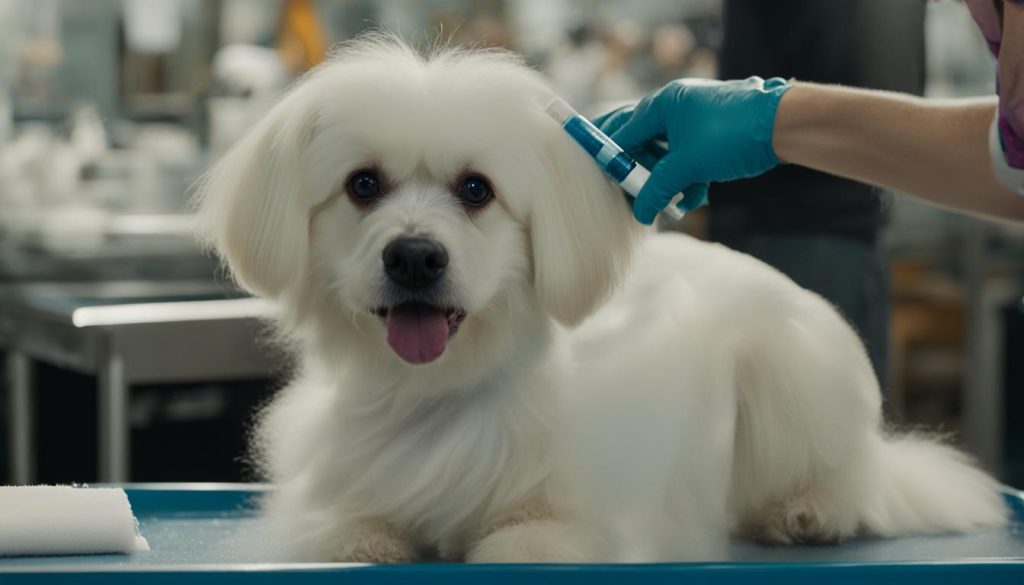
Grooming your dog’s bum area is an essential part of maintaining their hygiene and preventing unpleasant odors. By taking a few simple steps, you can keep your furry friend fresh and clean. Consider the following dog butt smell remedies to address any potential issues:
1. Professional Grooming
One effective way to prevent odor is to have a professional groomer clip the fur around your dog’s anus. This not only keeps the area clean and hygienic but also allows for easier visualization of any recurring issues or healing progress. A groomer can also provide additional grooming services, such as bathing, to remove any residue and reduce odor.
2. Regular Bathing
Bathing your dog is another important aspect of grooming to prevent smell. Use a gentle, dog-specific shampoo and focus on thoroughly cleaning the bum area. This can help remove traces of anal gland secretions and reduce the chances of odor buildup. However, it’s important not to overbathe your dog, as excessive bathing can lead to dry skin.
3. Maintaining Anal Gland Health
Regular anal gland expression is crucial to prevent odor and discomfort. While most dogs naturally express their anal glands during bowel movements, some may require manual expression by a veterinarian. If you notice any signs of anal gland issues, such as scooting or excessive licking, consult with a vet to determine the best course of action.
4. Keeping the Area Clean
In addition to grooming, it’s important to keep your dog’s bum area clean on a daily basis. Use pet-safe wipes or a damp cloth to wipe the area after each bowel movement. This helps remove any residual fecal matter and prevents the buildup of odor-causing bacteria. Remember to always use wipes that are specifically designed for dogs to avoid any potential irritation.
By following these dog butt smell remedies and incorporating them into your regular grooming routine, you can ensure that your canine companion stays fresh and odor-free. Maintaining good anal gland health and cleanliness will not only benefit your dog’s overall well-being but also create a more pleasant environment for both you and your pet.
Using Pet-Safe Wipes to Remove Odor
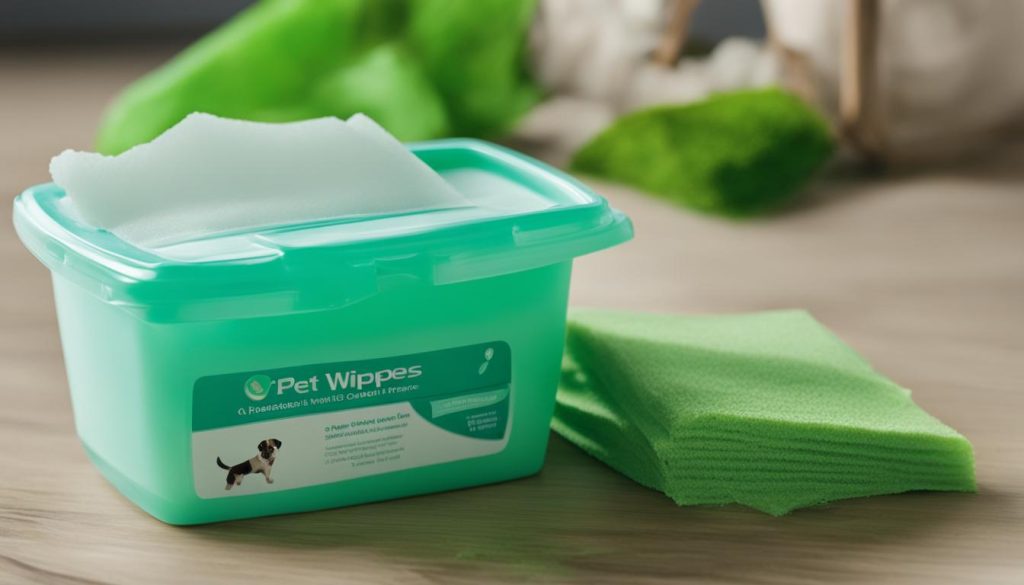
Eliminate dog anal gland odor
Dogs can sometimes have a persistent and unpleasant odor emanating from their anal glands. Fortunately, there are pet-safe wipes available that can effectively remove the smelly liquid and reduce the odor. These wipes are specifically designed for dogs and are gentle on their skin, making them safe to use in the anal gland area without causing any irritation.
Reducing dog gland smell
Using pet-safe wipes to clean the anal gland area is a convenient way to combat the odor between baths. Simply take a wipe and gently clean the area, ensuring that all traces of the liquid are removed. These wipes not only help eliminate the odor but also provide a fresh scent, masking any lingering smells.
Choosing deodorizing wipes created for dogs
It is important to select pet-safe wipes that are specifically created for dogs. These wipes are formulated to be gentle and effective in removing the anal gland odor. Avoid using regular wipes or products that are not specifically designed for dogs, as they may contain ingredients that can be harmful to your pet’s skin.
| Benefits of Using Pet-Safe Wipes | How to Use Pet-Safe Wipes |
|---|---|
| 1. Eliminates anal gland odor | 1. Gently wipe the anal gland area |
| 2. Safe and gentle on dog’s skin | 2. Ensure all traces of the liquid are removed |
| 3. Provides a fresh scent | 3. Dispose of the used wipe properly |
Using pet-safe wipes to remove anal gland odor is an effective and convenient solution for keeping your dog smelling fresh and clean. However, it is important to keep in mind that these wipes are not a substitute for addressing any underlying anal gland issues. If you notice persistent odor or other signs of anal gland problems, it is best to consult with your veterinarian for proper diagnosis and treatment.
Using Enzymatic Cleaners for Furniture and Flooring
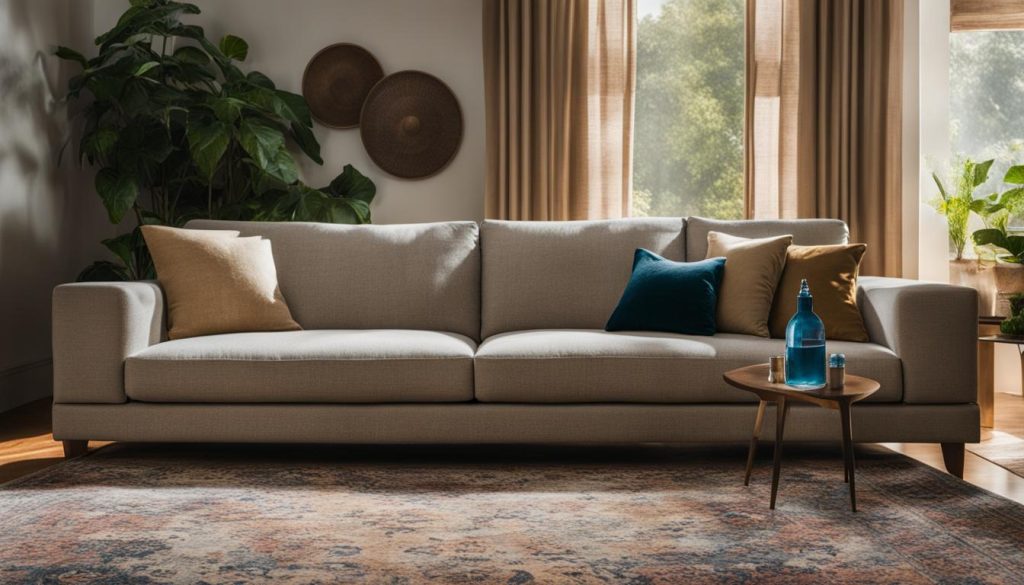
When it comes to eliminating dog anal gland odor from furniture and flooring, enzymatic cleaners are a highly effective solution. These specialized cleaners are designed to neutralize and break down pet odors, including those caused by anal gland secretions. Enzymatic cleaners work by releasing enzymes that target and break down the odor molecules responsible for the unpleasant smell.
Please be aware that while enzymatic cleaners are effective in removing odor, they should not be applied directly to your dog’s butt as they may cause irritation. Instead, use them on furniture or flooring where the odor may be present. Follow the instructions on the cleaner’s packaging for best results.
To maximize the efficacy of enzymatic cleaners, it’s essential to thoroughly clean the affected area before applying the cleaner. Use a mild detergent to remove any surface dirt or debris. Then, apply the enzymatic cleaner according to the instructions, ensuring that the affected area is completely saturated. Allow the cleaner to sit for the recommended amount of time, typically 10-15 minutes, before blotting or gently scrubbing the area with a clean cloth or sponge.
Enzymatic cleaners can be used on various surfaces, including carpets, upholstery, tile, and hardwood floors. It’s essential to spot test the cleaner in an inconspicuous area before using it on the entire surface to ensure compatibility and avoid any potential damage or discoloration.
Regular use of enzymatic cleaners, combined with other methods such as grooming and using pet-safe wipes, can help effectively eliminate dog anal gland odor from furniture and flooring, creating a fresh and clean environment for you and your furry friend.
Table: Comparison of Enzymatic Cleaners for Dog Anal Gland Odor Removal
| Enzymatic Cleaner | Key Features | Recommended Surfaces | Price Range |
|---|---|---|---|
| Nature’s Miracle Stain and Odor Remover | Advanced bio-enzymatic formula, dual-action for stains and odors | Carpet, upholstery, tile, hardwood floors | $10 – $20 |
| Rocco & Roxie Professional Strength Stain and Odor Eliminator | Enzyme-activated formula, chlorine-free and color-safe | Carpet, upholstery, tile, hardwood floors | $20 – $30 |
| Bio-OX Citrus Concentrate | Citrus-based enzymatic formula, eco-friendly and non-toxic | Carpet, upholstery, tile, hardwood floors | $15 – $25 |
These enzymatic cleaners offer different features and price ranges, allowing you to choose one that best suits your needs and budget. Always read the product labels and follow the manufacturer’s instructions for proper application and safety precautions.
Using Medication to Treat Anal Gland Infections
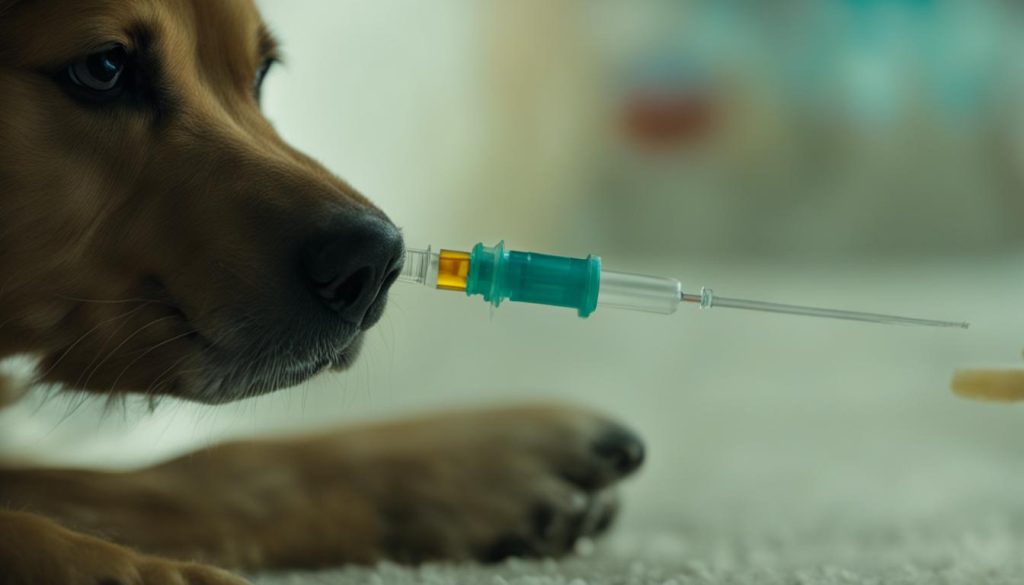
When dealing with anal gland issues in dogs, it’s important to address infections promptly. In some cases, the foul smell associated with anal gland problems may be a result of an infection. In these instances, medication prescribed by a veterinarian can be highly effective in treating the underlying infection and eliminating the unpleasant odor.
Topical antiseptics are often used to clean and disinfect the affected area, promoting healing and preventing further infection. Antibiotics may also be prescribed to combat bacteria that contribute to the infection. Additionally, anti-inflammatory medications can help reduce pain and discomfort, allowing the dog’s anal glands to heal properly.
In severe cases, a veterinarian may manually express or flush the anal glands to relieve the infection. This procedure should only be performed under veterinary supervision to ensure the safety and well-being of the dog. By addressing the infection, the foul smell associated with anal gland problems can be effectively treated and eliminated.
Treatment of Anal Gland Infections
| Medication | Usage | Benefits |
|---|---|---|
| Topical antiseptics | Applied directly to the affected area | Cleans and disinfects, promotes healing |
| Antibiotics | Oral or injectable | Treats bacterial infections |
| Anti-inflammatory medications | Oral or injectable | Reduces pain and discomfort |
It is essential to follow the veterinarian’s instructions and complete the full course of prescribed medication to ensure effective treatment and prevent a recurrence of the infection.
Using Baking Soda for Gland Smell Removal
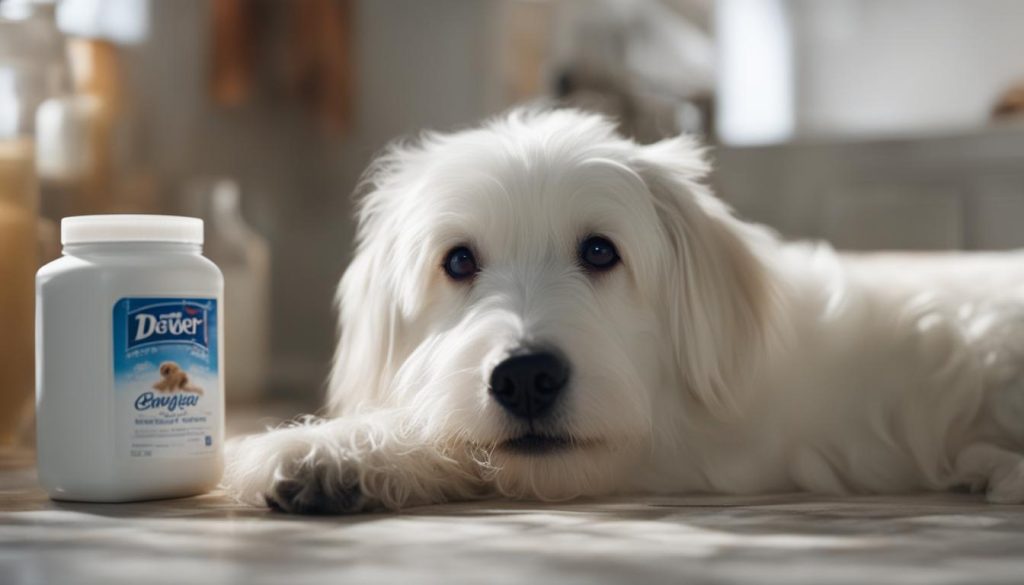
If you’re looking for a natural and effective way to remove dog gland odor, baking soda might be just what you need. Baking soda, also known as sodium bicarbonate, has odor-neutralizing properties and can help eliminate the unpleasant smell associated with anal gland issues. Here are a few ways you can use baking soda to tackle gland smell:
Mixing Baking Soda with Water
One simple method is to mix baking soda with water to create a solution that can be used to wipe your dog’s glands. Start by combining one part baking soda with three parts water to form a paste-like consistency. Then, using a soft cloth or cotton pad, apply the mixture to your dog’s anal gland area and gently wipe. This can help neutralize the odor and keep your dog smelling fresh. However, it’s important to consult with your veterinarian before using this method to ensure it’s safe for your dog.
Baking Soda in Your Dog’s Bath
Another way to use baking soda is by adding it to your dog’s bath. Fill the tub with warm water and add a couple of tablespoons of baking soda. Mix well to ensure the baking soda is evenly distributed. Then, bathe your dog as usual, making sure to thoroughly rinse the anal gland area. This can help neutralize odors and keep your dog’s coat smelling clean and fresh. Again, consult with your vet before using baking soda in your dog’s bath.
Cautionary Note
While baking soda is generally safe to use on dogs, it’s important to remember that every dog is unique. Some dogs may have allergies or sensitivities to baking soda, so it’s crucial to consult with your vet before using it. Additionally, if your dog’s anal gland odor persists or worsens despite using baking soda, it’s advisable to seek veterinary advice, as there may be an underlying issue that needs to be addressed.
Using baking soda can be an affordable and natural way to address dog gland odor removal. However, it’s always best to consult with a vet and follow their recommendations for your specific dog’s needs.
Expressing Your Dog’s Anal Glands at Home
If your dog is experiencing anal gland issues, you may need to express the glands at home to provide relief. While it is always recommended to consult with a veterinarian, expressing your dog’s anal glands can be done safely with proper technique and precautions.
Before attempting to express your dog’s anal glands, gather the necessary supplies. You will need disposable gloves, an old towel, and a bowl to catch the fluid. It is important to keep the area clean and hygienic during the process.
To express the anal glands, gently lift your dog’s tail and locate the glands on either side of the anus. With gloved hands, apply gentle pressure to the glands, moving from the base towards the opening. Be cautious not to apply excessive force to avoid injury or discomfort to your dog.
As you apply pressure, the fluid should be released into the bowl or towel. Once the glands are empty, use the towel to wipe the area clean and prevent any further leakage. Dispose of the gloves and towel properly to maintain cleanliness.
| Benefits of Expressing Your Dog’s Anal Glands |
|---|
| Relieves discomfort and pain caused by blocked or infected anal glands |
| Helps prevent the development of more serious anal gland issues |
| Reduces the chance of your dog scooting or excessively licking the anal area |
| Promotes overall anal gland health and prevents foul odor |
Expressing your dog’s anal glands at home can provide immediate relief and prevent further complications. However, it is important to note that expressing the glands should not be a substitute for regular veterinary care. If your dog has recurrent anal gland problems or the fluid appears abnormal, consult with a veterinarian for a thorough examination and appropriate treatment.
Precautions When Expressing Anal Glands at Home
- Do not attempt to express the anal glands if your dog is aggressive or shows signs of pain or discomfort.
- Always use disposable gloves and maintain proper hygiene to prevent the spread of bacteria.
- If you are unsure or uncomfortable with the process, seek guidance from a professional groomer or veterinarian.
- Regularly monitor your dog’s anal gland health and consult with a veterinarian for any concerns or recurring issues.
Using White Spirit Vinegar as an Odor Neutralizer
Vinegar is a versatile and effective natural solution for neutralizing odors, including the unpleasant smell caused by dog gland issues. White spirit vinegar, when diluted in water, can be safely used on various surfaces to eliminate the scent. However, it is important to consult with your veterinarian before using vinegar directly on your dog’s butt to ensure it is safe for their specific condition.
To use vinegar as an odor-neutralizing solution, mix equal parts white spirit vinegar and water in a spray bottle. Shake well to ensure proper dilution. You can then spray the vinegar solution onto your dog’s bedding, floors, or linens to help eliminate any residual odors from the anal glands. Allow the solution to sit for a few minutes before wiping it away with a clean cloth or paper towel.
| Vinegar Solution | Water |
|---|---|
| 1 cup | 1 cup |
If you prefer a more powerful cleaning solution, you can mix vinegar with baking soda and water. This combination creates a natural deodorizing paste that can be applied to surfaces affected by the anal gland odor. Leave the paste on for a few minutes to allow it to work its magic, then scrub away with a sponge or cloth. Rinse thoroughly with water to remove any residue.
Cleaning Furniture with Home Remedies
When it comes to dealing with dog gland smell on furniture, there are several effective home remedies that can help eliminate the unpleasant odor. These remedies are not only affordable but also safe for both your furniture and your furry friend. By using simple household ingredients, you can tackle the anal gland odor and restore freshness to your furniture.
Baking Soda
Baking soda is a versatile remedy that can be used to neutralize dog gland smell on furniture. Simply sprinkle baking soda on the affected areas and let it sit for a few hours or overnight. This natural deodorizer works by absorbing odors and leaving your furniture smelling fresh. Afterward, vacuum or wipe away the baking soda, and you’ll notice a significant improvement in the smell.
Vinegar and Water Solution
A mixture of vinegar and water can be an effective cleaning solution for removing anal gland odor from furniture. Combine equal parts of white vinegar and water in a spray bottle and mist the affected areas. Vinegar is known for its odor-neutralizing properties and can help eliminate the unpleasant smell. Allow the solution to sit for a few minutes before blotting it with a clean cloth or paper towel.
Detergent Powder
In some cases, using a mild detergent powder can help eliminate dog gland smell from furniture upholstery. Dilute a small amount of detergent powder in water and apply it to the affected areas. Gently scrub the upholstery with a soft brush or cloth, focusing on the smelly spots. Rinse the area with clean water and blot dry with a towel. This method can be particularly effective for removing stubborn odors.
| Home Remedy | Method | Effectiveness |
|---|---|---|
| Baking Soda | Sprinkle on affected areas, let sit, then vacuum or wipe away | High |
| Vinegar and Water Solution | Mist on affected areas, let sit, then blot with cloth or paper towel | Medium |
| Detergent Powder | Dilute in water, scrub affected areas, rinse, then blot dry | Low |
Remember to test these remedies on a small, inconspicuous area of your furniture before applying them to the entire surface. This will help ensure that the remedies do not cause any damage or discoloration. If you have concerns about using these home remedies or if the odor persists, it’s always a good idea to consult a professional upholstery cleaner for further assistance.
Precautions and Alternative Solutions
When it comes to eliminating dog gland smell, there are a few precautions to keep in mind. While some methods may be effective, it’s important to exercise caution and consider alternative solutions to ensure the well-being of your dog and the cleanliness of your home.
One common alternative solution for anal gland odor is the use of pineapple juice. However, pineapple juice can stain fabrics, so it should be used with caution. If you choose to use pineapple juice as a remedy, be sure to test it on a small, inconspicuous area first to avoid any potential damage to your furniture or carpets.
Additionally, when dealing with dog gland smell, it’s best to avoid using strong commercial cleaning products that may have unpleasant smells themselves. Instead, opt for natural alternatives like vinegar and baking soda, which can be effective in neutralizing odors. However, always consult with your veterinarian before using these substances on your dog’s butt to ensure they are safe and appropriate.
If all else fails and the odor persists, consider seeking professional help or replacing the furniture that has been contaminated with dog anal gland fluid. Professional cleaning services can often provide effective solutions for eliminating stubborn odors.
| Precautions and Alternative Solutions |
|---|
| Use pineapple juice cautiously to avoid fabric stains |
| Avoid using strong commercial cleaning products |
| Consult with a veterinarian before using vinegar and baking soda on your dog’s butt |
| Consider professional help or furniture replacement if the odor persists |
Wrapping Up
After exploring various methods to tackle dog gland smell, it is clear that there are effective ways to reduce and eliminate the odor. However, it is crucial to address any underlying anal gland issues with the guidance of a veterinarian. They can provide a thorough diagnosis and recommend a suitable treatment plan tailored to your dog’s specific needs.
Regular grooming plays a key role in preventing and managing the odor. Consider having a professional groomer clip the area around the anus for better hygiene and easier detection of recurring issues. Bathing your dog and using pet-safe wipes in-between baths can also minimize the smell caused by anal gland secretions.
Enzymatic cleaners are effective for neutralizing dog gland odor on furniture and flooring, while white spirit vinegar can serve as a natural odor neutralizer for bedding, floors, and linens. However, it is important to consult with your vet before using vinegar or any home remedy on your dog’s butt to ensure their safety and well-being.
Remember, maintaining a healthy diet and exercise routine for your dog contributes to overall gland health. By following these measures and working closely with your veterinarian, you can successfully reduce and manage dog gland smell, ensuring a more pleasant environment for both you and your furry friend.
FAQ
What are the signs of anal gland issues in dogs?
The signs of anal gland problems in dogs include greasy fur around the anus, thickening of the skin, pain and discomfort when sitting or defecating, excessive licking or biting of the anus, scooting on the floor, and abnormal discharge or growths around the anus.
How can I groom my dog’s bum area to prevent odor?
Consider having a professional groomer clip the area around the anus for hygienic purposes. This allows for easier visualization of any recurring issues or healing progress. Bathing your dog during the grooming session can also help remove traces of anal gland secretions and reduce odor.
Can I use pet-safe wipes to remove the odor?
Yes, pet-safe wipes specifically designed for dogs can be used to remove the smelly liquid from the anal glands and mask the odor. Using these wipes in-between baths can help minimize the odor from the anal glands. Make sure to choose deodorizing wipes created for dogs.
How can enzymatic cleaners help with anal gland odor on furniture and flooring?
Enzymatic cleaners release enzymes that break down the odor molecules responsible for the smell. They are effective in neutralizing and breaking down pet odors, including those caused by anal gland secretions. However, avoid using enzymatic cleaners directly on the dog’s butt as they can cause irritation. Instead, use them on furniture or flooring where the odor may be present.
How are anal gland infections treated?
If the anal gland issue is caused by an infection, a veterinarian may prescribe topical antiseptics, antibiotics, or anti-inflammatory medications. Depending on the severity, your vet may also manually express or flush the anal glands to relieve the infection. Treating the underlying infection will eliminate the foul smell associated with anal gland problems.
Can I use baking soda to eliminate gland smell?
Yes, baking soda can be sprinkled on smelly areas to neutralize the odor-causing acids. It is a natural and safe way to eliminate anal gland smells and can be easily cleaned up with a vacuum or scoop. Baking soda can also be mixed with water to create a solution for wiping your dog’s glands or used in their bath to neutralize odors. Consult with your vet before using this method.
How can I express my dog’s anal glands at home?
Expressing a dog’s anal glands can be done at home using disposable medical gloves and an old towel. With your dog occupied, gently squeeze the anal glands, located on either side of the butt, to release the fluid. Catch the liquid in a bowl or towel and wipe the area clean. If the fluid is abnormal or concerning, consult with a veterinarian.
Can white spirit vinegar be used as an odor neutralizer?
Yes, white spirit vinegar diluted in water can effectively neutralize unpleasant odors on your dog’s bedding, floors, and linens. It can be used as a natural cleaning solution to eliminate the unpleasant scent from the anal glands. Mixing vinegar with baking soda and water can create a more powerful cleaning solution. However, always check with your vet before using vinegar on your dog’s butt.
Are there home remedies for cleaning furniture contaminated with anal gland fluid?
Yes, home remedies like baking soda, hydrogen peroxide, detergent powder, and vinegar can be used to clean furniture that has been contaminated with dog anal gland fluid. These remedies help break down the odor-causing molecules and can be an effective way to eliminate the smell. However, test these remedies on a small corner of the furniture first to avoid any potential staining or discoloration.
Are there any precautions or alternative solutions to consider?
While there are various solutions to remove dog gland smell, it is important to exercise precautions and consider alternatives. Be cautious with the use of pineapple juice as it can stain fabrics. Avoid using strong commercial cleaning products that may have unpleasant smells themselves. Consider using removable furniture covers to make cleaning easier in the future. If all else fails, consider seeking professional help or replacing the furniture.






